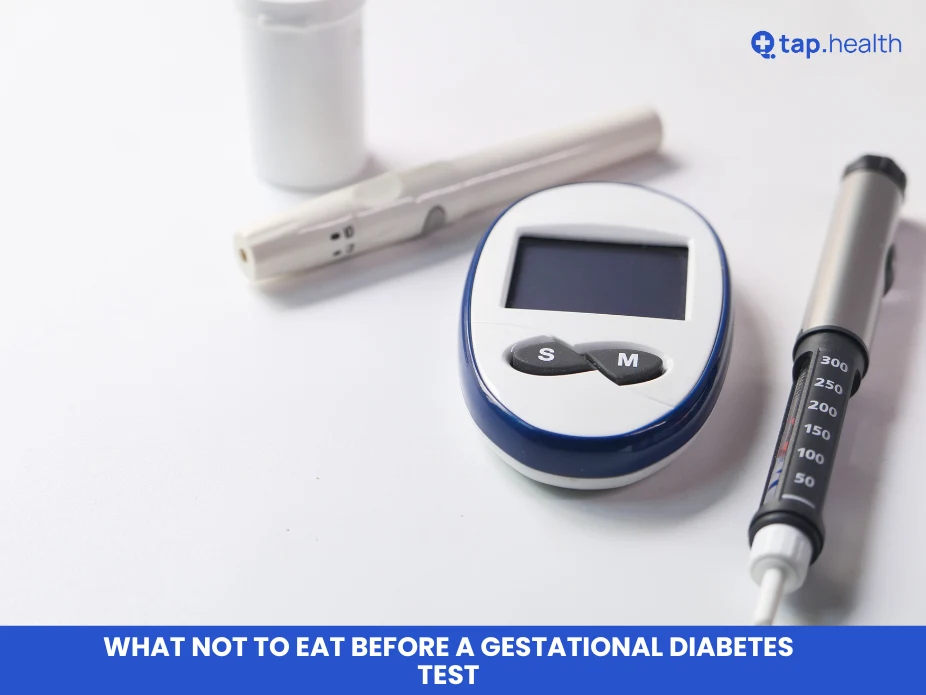The gestational diabetes test is an important part of pregnancy care, designed to check how your body processes sugar. Preparing for this test can be a little nerve-wracking, especially if you’re unsure about what to eat—or what to avoid—beforehand. In this guide, we’ll break down exactly what not to eat before your test, real-life examples, and tips from experts to make the process easier for you.
Why the Gestational Diabetes Test Matters
Gestational diabetes affects how your body uses sugar during pregnancy. Left unmanaged, it can lead to complications for both mom and baby. The glucose tolerance test (GTT) measures how efficiently your body processes sugar after consuming a glucose drink.
Preparing properly for the test is crucial because certain foods can skew the results, leading to a false positive or negative.
What Not to Eat Before a Gestational Diabetes Test
1. Avoid Sugary Foods and Drinks
Foods high in sugar, like sweets, desserts, and sugary beverages, can artificially raise your blood sugar levels. For instance:
- Pastries
- Soda
- Candies
Even a seemingly healthy option like fruit juice can cause a spike in blood sugar.
2. Say No to Refined Carbs
Refined carbohydrates like white bread, pasta, and processed snacks break down quickly into sugar, potentially elevating your blood glucose levels. Examples include:
- White rice
- White bread
- Chips
3. Steer Clear of Fatty, Fried Foods
Fried and fatty foods can slow digestion, which may affect how your body processes the glucose drink during the test. Avoid:
- French fries
- Fried chicken
- Heavily buttered dishes
4. Skip High-Glycemic Fruits
Fruits like bananas, mangoes, and grapes are healthy in general, but their natural sugar content could skew your results. Stick to lower-glycemic fruits like apples or berries if you need a snack.
5. Limit Dairy Products
Full-fat dairy products like milkshakes or cream-based dishes can slow down digestion, impacting how your body handles the glucose drink.
Also Read : Low White Blood Cell Count & Diabetes
Real-Life Scenarios: Preparing for the Test
Let’s hear from real moms who’ve been through it.
Megha, a teacher from Delhi, recalls how she unknowingly had a sugary smoothie before her first gestational diabetes test. “I failed the test and had to take it again. My doctor told me that even a seemingly healthy drink can affect the results.”
Similarly, Anita, a software engineer in Bangalore, shares how her second test went smoothly after following her doctor’s advice to eat a balanced meal the night before and avoid sugary snacks.
These stories show how avoiding certain foods can help you feel more confident going into your test.
Expert Contributions: Insights from Healthcare Professionals
Dr. Priya Sharma, a gynecologist in Mumbai, emphasizes, “The gestational diabetes test is a key part of prenatal care, and preparation plays an important role in ensuring accurate results. Stick to a balanced diet in the days leading up to the test, and avoid anything sugary or fried within 12 hours before.”
She also advises pregnant women to stay calm during the test. “Stress can elevate your blood sugar too, so try to relax and follow your doctor’s instructions closely.”
For more tips from Dr. Sharma, visit her clinic’s page.
Recommendations Grounded in Proven Research and Facts
Here’s a list of simple tips to help you prepare for the gestational diabetes test:
1. Choose Balanced Meals
Focus on meals rich in whole grains, lean protein, and vegetables in the days leading up to your test.
2. Avoid Eating Late
Refrain from eating or snacking late at night before your test, especially if it’s an early morning appointment.
3. Stay Hydrated
Drink plenty of water, as dehydration can affect blood sugar levels. Avoid sugary drinks like soda or energy drinks.
4. Follow Your Doctor’s Instructions
Some doctors recommend fasting for 8–12 hours before the test, while others allow a light meal. Always clarify what’s expected.
5. Practice Portion Control
Even healthy foods can cause blood sugar fluctuations if consumed in large portions. Eat moderately and listen to your body’s hunger cues.
FAQs
What foods should I avoid before a gestational diabetes test?
Avoid sugary foods, refined carbs, fatty dishes, high-glycemic fruits, and full-fat dairy products to ensure accurate test results.
Can I eat anything before the test?
Follow your doctor’s instructions. Some tests require fasting, while others allow a light meal beforehand.
Will eating sweets the day before affect my test?
Eating sugary foods the day before may not significantly impact the results, but it’s best to eat balanced meals leading up to the test.
How can I prepare for a fasting glucose test?
Drink water, avoid caffeine, and fast for 8–12 hours if required. Clarify instructions with your doctor beforehand.
What happens if I fail the test?
If your results indicate high blood sugar, you may need to take a follow-up test or discuss a management plan with your healthcare provider.



